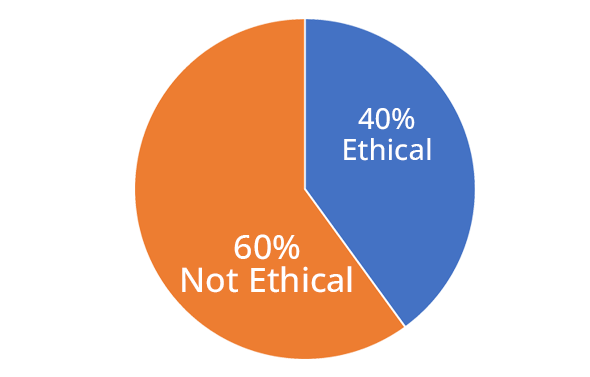This is the November 2023 edition of our monthly series of Ethics case studies titled What Do You Think? This series is comprised of case studies from NSPE archives, involving both real and hypothetical matters submitted by engineers, public officials and members of the public.
Your peers and the NSPE Board of Ethical Review have reviewed the facts of the case as shown below. And, here are the results.
Your opinion has been registered for the November 2023 edition of our monthly series of Ethics case studies titled What Do You Think?
Your vote is recorded as:

Want to know how your peers voted? We’ll send you an email with the poll results on
November 28.
November 28.
Your opinion has been registered for the November 2023 edition of our monthly series of Ethics case studies titled What Do You Think?
Your vote is recorded as:

Want to know how your peers voted? We’ll send you an email with the poll results on
November 28.
November 28.
A Review of the Facts
Engineer Mitch agrees to provide consulting services to RMF, Inc., in connection with the development of a new product for manufacture. He develops a preliminary report, which is approved, then develops the design for the product. Mitch and RMF, Inc., do not negotiate any terms in their agreement relating to the actual ownership of the design of the product. Neither takes any steps to seek patent protection. When the design reaches the production stage, RMF, Inc., terminates the services of Mitch in accordance with their agreement.
Thereafter, Mitch agrees to provide consulting services to SYS, Inc., a competitor of RMF, Inc. As a part of those services, he divulges specific information unique to the product designed for RMF, Inc.
What Do You Think?
Was it ethical for Mitch to divulge specific information to SYS, Inc., unique to the product designed earlier by him for RMF, Inc.?
Here is the result of our survey of your peers:

Applicable NSPE Code References:
II.1.c
Engineers shall not reveal facts, data, or information without the prior consent of the client or employer except as authorized or required by law or this Code.III.4
Engineers shall not disclose, without consent, confidential information concerning the business affairs or technical processes of any present or former client or employer, or public body on which they serve.III.9.c
Engineers, before undertaking work for others in connection with which the engineer may make improvements, plans, designs, inventions, or other records that may justify copyrights or patents, should enter into a positive agreement regarding ownership.
Discussion
As with many provisions of the NSPE Code of Ethics, Code II.1.c. appears to be stated in a clear and concise way. It recognizes that the engineer has the obligation to refrain from revealing factual information obtained in a professional capacity without the permission of the client or employer except under certain specific circumstances. However, that is subject to a degree of interpretation.
From its earliest days, the Board has had to grapple with the meaning of the language contained in Code II.1.c. The Board faced Case 61-8 quite similarly to the instant one. That case involved an engineer who was employed by the ABC Company and assigned by his supervisor to develop processing equipment for the manufacture of certain chemical products. In his previous employment with the XYZ Company, the engineer had participated in the development of similar equipment. The technical information concerning the equipment had not been published in the technical press, or otherwise released. By virtue of his previous involvement in its development, the engineer was familiar with the equipment and the principles of its design. His supervisors in the ABC Company suggested that that knowledge of the particular equipment would be useful in developing similar equipment for their use and expected him to make it available to them.
In its decision on Case 61-8, the Board noted that most employers of engineers accept the obligation of permitting their engineers to decide for themselves what information they can carry and use from job to job, recognizing the ethical duty of the engineer not to disclose confidential information of a former employer. The Board concluded that inasmuch as the equipment developed for the XYZ Company had not been made known to the public or the industry, it was in the nature of a “trade secret” and the engineer who participated in its development may not ethically use or impart that particular knowledge to another employer without the consent of his former employer. He may, though, ethically apply general knowledge and general engineering principles gained in his former employment to solving the problems of ABC Company.
Although Case 61-8 is quite similar, it relates to the ethical obligation of employees, while the present case involves the ethical obligation of a consultant. However, that narrow issue is easily dispensed because all Code references pertaining to the ethical obligation of the engineer to maintain confidentiality refer to both the employer and the client. (See Code II.1.c. and Code III.4) This would clearly suggest that the drafters of the Code intended that the obligation to maintain confidentiality applies to the employed engineer as well as the consulting engineer. It is the Board’s view that consistent with Case 61-8, it would be unethical for Mitch to divulge specific information to SYS, Inc., unique to the product designed earlier by him for RMF, Inc.
It should be pointed out that if the information divulged is generally available within the industry then his conduct might be considered proper.
We note that since the rendering of Case 61-8, the NSPE Code of Ethics has been substantially modified. Of particular mention, in the context of this case, we refer to Code III.9.c., which admonishes engineers to take affirmative steps with employers or clients regarding ownership of patents or copyrights. In today’s highly mobile and competitive society, more and more employers are demanding, and employees are expecting, special terms of employment that will clearly spell out the duties and obligations of both with respect to confidentiality and rights relating to intellectual property. That approach is a positive one and will take some of the mystery out of these matters. Presumably, the ethical question raised in this case could have been more easily interpreted had Mitch and RMF, Inc., formally agreed to ownership of the design of the product.
The Ethical Review Board’s Conclusion

It was unethical for Mitch to divulge specific information to SYS, Inc., unique to the product designed earlier by him for RMF, Inc.
BOARD OF ETHICAL REVIEW
Eugene N. Bechamps, P.E.; Robert J. Haefeli, P.E.; Ernest C. James, P.E.; Robert W. Jarvis, P.E.; J. Kent Roberts, P.E.; Everett S. Thompson, P.E.; Herbert G. Koogle, P.E.-L.S., chairman
Note – In regard to the question of application of the Code to corporations vis-a-vis real persons, business form or type should not negate nor influence conformance of individuals to the Code. The Code deals with professional services, which services must be performed by real persons. Real persons in turn establish and implement policies within business structures. The Code is clearly written to apply to the Engineer and it is incumbent on a member of NSPE to endeavor to live up to its provisions. This applies to all pertinent sections of the Code. This opinion is based on data submitted to the Board of Ethical Review and does not necessarily represent all of the pertinent facts when applied to a specific case. This opinion is for educational purposes only and should not be construed as expressing any opinion on the ethics of specific individuals. This opinion may be reprinted without further permission, provided that this statement is included before or after the text of the case.









I’d have no problem with Mitch being able to share the information PROVIDED he and RMF have a written agreement specifically stating who owned the IP Mitch produced and under what terms it doesn’t automatically become a de-facto trade secret. Absent that, then it seems the IP is wholly-owned by RMF.
An exception to the above would be if Mitch’s report contained no original work but was, say, an aggregation of publicly-available information, or was an opinion developed by Mitch in response to, say, questions by SYS. In those cases, Mitch’s knowledge becomes part of what may make him a subject matter expert (SME). To say he could not ethically use this as part of his aggregated experience would not seem right or fair. Perhaps the degree of originality is the dividing point, much as is the case with patents.
Greetings, I think you chose the wrong word in the following statement. You should exchange “admonishes” with “commends”. The way you wrote it is opposite what you mean. “We note that since the rendering of Case 61-8, the NSPE Code of Ethics has been substantially modified. Of particular mention, in the context of this case, we refer to Code III.9.c., which admonishes engineers to take affirmative steps with employers or clients regarding ownership of patents or copyrights.”
I agree with this decision. I worked in the automotive industry for over 40 years. In that time, I saw different ways to solve the same issue or problem, I used that knowledge to solve the problems given to me by those that employed me. I did not divulge nor use the exact same solutions at the different companies. I was once asked how my former company solved a problem that was quite similar to the one that, we were working on. I told them that I was not at liberty to tell them that and the conversation was ended. I did use my knowledge to lead the team to a better solution, since I knew the problems, we incurred when solving this problem at the last company. This greatly helped and I felt that I had not violated my ethical code in doing so.
Thank you for this! These really make you think and help keep us all on the right track!
Is there implied ownership of Intellectual Property in the absence of any reference to it in a contract or other agreement? Most contracts have Intellectual Property ownership rights clauses and Non-Disclosure clauses to address the specific issue between Mitch and RMF, Inc. that is discussed here. If RMF, Inc. does not reserve any Intellectual Property rights or have a Non-Disclosure requirement, those omissions could be reasonably interpreted by Mitch to indicate that RMF, Inc. does not assign value to the information he developed or care if the information is used by others. Taken to the extreme, no junior engineer could ever apply the knowledge gained with each new design assignment to a future design if there is implied ownership of the knowledge (a broad definition of Intellectual Property) gained with each prior work assignment. The future use of information gained on a design project, where that information is not subject to defined Intellectual Property or Non-Disclosure limitations, is Ethical.
Engineering ethics aside, an honorable man does not disclose what is what is discussed with another party.
So, how does this proceed? It was ruled unethical, what happens next? Is the subject engineer being sued? What about the state board that has jurisdiction. A bit of detail would be informative. That might help all parties to bring some depth and focus to the case. Just a suggest
Note, it was specifically stated that, “Mitch and RMF, Inc., do not negotiate any terms in their agreement relating to the actual ownership of the design of the product. Neither takes any steps to seek patent protection.” Based on this, I was inclined to say “Ethical” even though it is really fairly ambiguous. As someone else pointed out, carried to its logical extreme, to not be allowed to carry lessons learned from one project to another would render experience essentially meaningless because you would not be allowed to carry lessons learned from one project to another.
Does RMF’s failure to include protections in their contract with Mitch amount to implied consent under Articles II.1.c and III.4? If so, Mitch’s actions would be ethical. However, do his actions become unethical under Article III.9.c because he (Mitch) did not himself require language in this consulting agreement regarding ownership of the product information.
I am of the opinion that the initial client should have had Mitch sign a non-disclosure agreement